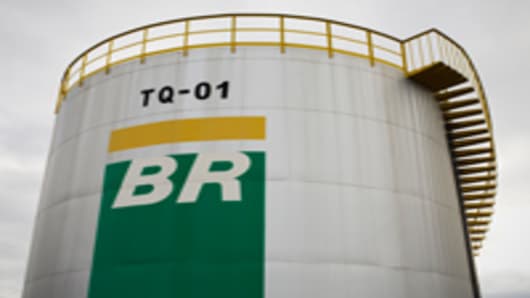Brazilian oil giant Petrobras is confident the type of drilling accident BP faced in the Gulf of Mexico last year would not happen in its offshore operations, a company official said recently.
"Our own technicians concluded under the same circumstances we would not have had this spill," said Neyde Safadi, Petrobras general manager for corporate finance, earlier this month.
Petrobras, Brazil's majority owned oil company, is the world's largest deep driller, responsible for 20 percent of deepwater production, followed by ExxonMobil, at 13 percent, then Shell and BP, both at 12 percent.
As Brazil stands in the ranks of the fast growing BRIC nations, perhaps no Brazilian company is watched as closely as Petrobras because of the huge promise of future reserves which could help the country’s transformation to a developed nation.
Petrobras’ ambitious deep water drilling plans could potentially lift the state-controlled oil company’s proven reserves to 29 billion barrels, nearly double the current 15.9 billion barrels, on par with the world’s major oil producers.
Of its current reserves, 32 percent are in ultra deepwater and 50 percent in deepwater. It is the world’s fifth largest oil and gas producer after ExxonMobil , BP , Shell and Chevron and the fourth in terms of proven reserves.
Safadi, in a recent discussion with the Financial Women's Association of New York, said her CFO, Almir Guilherme Barbassa, used a recent trip to China with Brazilian officials to explore future financing, as the company tries to raise funds for its drilling program off the Atlantic coast.
Brazilian President Dilma Rousseff and other officials earlier this month visited China to meet leaders of the other BRIC countries: Russia, China and India.
Petrobras, which has a capital investment plan of $224.1 billion through 2014, has already completed financing for this year, but will be back in the market seeking to borrow $12 billion next year, Safadi said.
“China is one possibility,” she said, speaking to the financial women's group, which was winding down a three-city tour of Brazil. Petrobras made history with its record $70 billion IPO in 2010.
Safadi later explained in a brief interview that Petrobras routinely seeks out global sources of financing and is looking at opportunities ahead of next year. It had previously borrowed from China Development Bank in 2009.
Safadi said Petrobras expects to be producing 2.98 million barrels per day in 2014, up from its current 2.5 million barrels. By 2020, it expects to produce 5.4 million barrels a day, she said.
The company’s efforts to tap into the ‘pre-salt’ or a salt formation that rests a top oil deposits is the key to its production plans. The salt formation, created when South America and Africa split apart millions of years ago, is 300 kilometers from the shoreline.
“The salt behaves like tooth paste because of the pressure and the temperature so drilling through is not easy,” said Enrique Sira, director of research for Latin America for IHS Cera in Rio in a separate interview.
“We think Brazil has the potential and the resources to go from the 2 million barrels it produces today to five million by 2030,” he said. Petrobras forecasts an earlier time frame.
While investment bankers have targeted potential acquisition prospects for the oil giant in North America and elsewhere, Safadi said it's not the company's main objective to make deals. "There may be some acquisitions here and there ... so far, it's not part of our main objectives," she said.
Watch our special coverage, "Access Brazil,"Monday-Thursday, April 25-28. Maria Bartiromo and Michelle Caruso-Cabrera report from Brazil on Squawk On The Street, 9-11am ET, Power Lunch, 1-2pm ET and Closing Bell, 3-5pm ET on CNBC.




